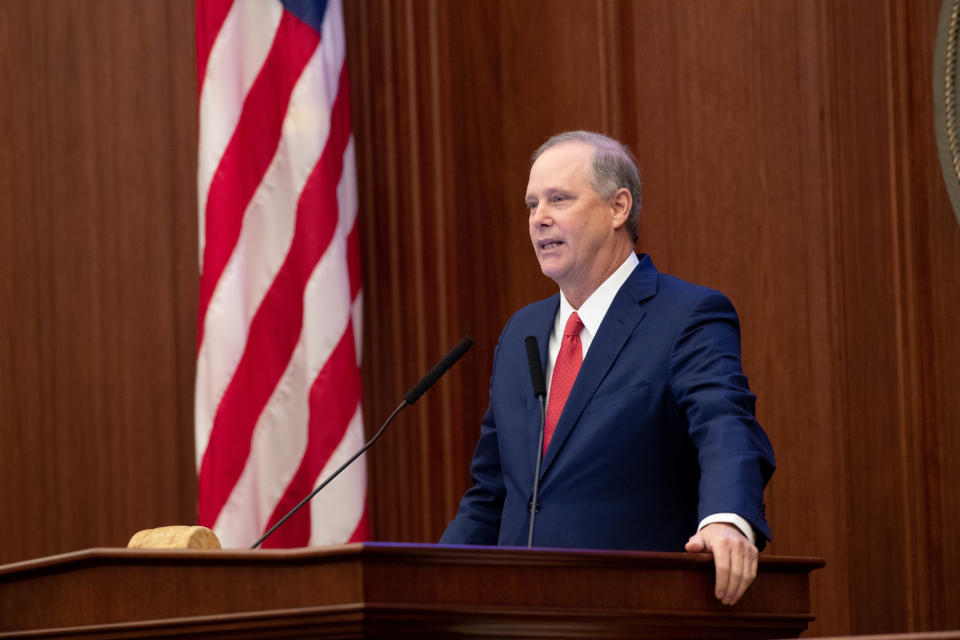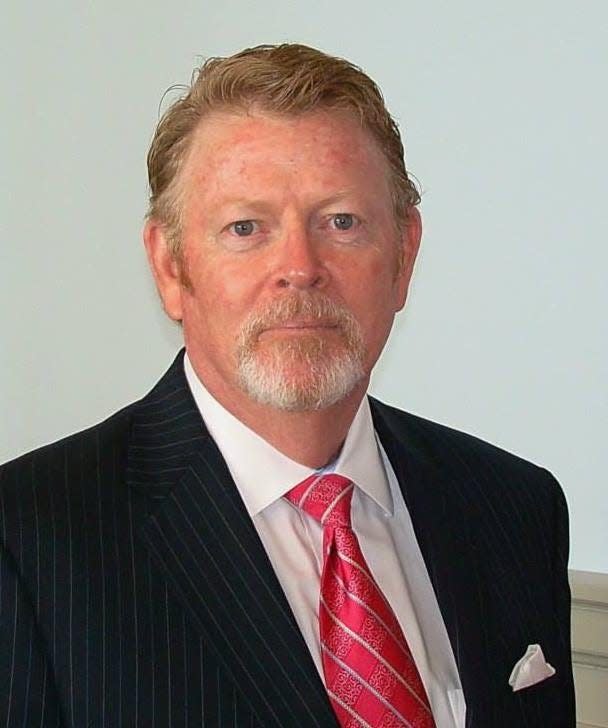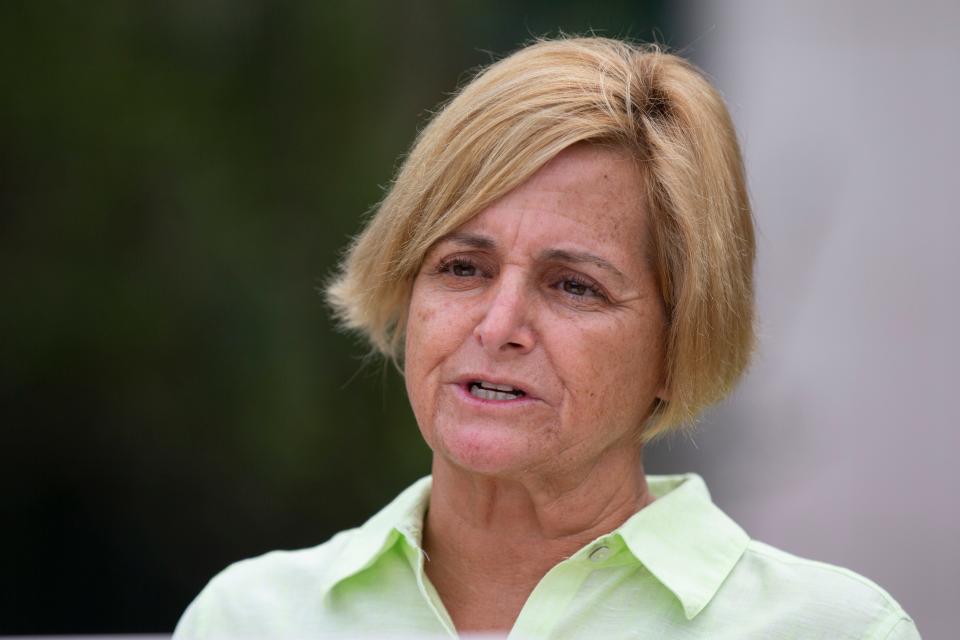'Here we go again': Florida lawmakers try again to cut new state workers off from pension plan
- Oops!Something went wrong.Please try again later.
- Oops!Something went wrong.Please try again later.
Like other legislative leaders before him, Senate President Wilton Simpson is determined to eliminate the traditional pension for state workers, teachers, and local government employees.
His proposal poses a threat to the retirement benefits for tens of thousands of current and future recipients, according to opponents who have defeated some form of the idea three times in the last seven legislative sessions.
“Here we go again,” said state Sen. Loranne Ausley, D-Tallahassee. “This is just another attempt to avoid the state’s responsibility to adequately fund the retirement system, ... one of the strongest in the country.”
This year's bill (SB 84) by state Sen. Ray Rodrigues, R-Estero, would prohibit anyone hired after June 30, 2022, from joining the traditional state pension plan. It goes before the Senate Government Oversight and Accountability Committee, chaired by Rodrigues, on Thursday.
Simpson, a Trilby Republican, failed twice in his time as senator to steer new hires away from the Florida Retirement System's pension plan, or "defined benefit program" – an investment fund managed by professionals at the State Board of Administration – and into a "defined contribution plan," a kind of 401(k) managed by the individual worker.
Related: Florida GOP senator pushing ballot measure exempting some workers from $15 minimum wage
Now, as Senate President, he is fully behind Rodrigues' more aggressive version of the idea. He scheduled just two committees, instead of the usual three, to review it before the bill can get to the Senate floor.
Simpson said he's watched the pension fund's unfunded liability — the amount of money needed to pay out all promised benefits compared to the amount on hand — grow from $15.8 billion in 2008 to $36 billion today.
More coverage: Florida Democrats, Republicans at odds over need for special legislative session on state budget
"It is our duty to ensure Florida’s employees have retirement plans they can count on, and that requires us to ensure we maintain long-term solvency," Simpson said.
According to an independent audit commissioned by the state, the Florida Retirement System (FRS) has enough money to pay 82% of promised benefits to the 432,000 seniors now collecting benefits and to the 644,000 workers who are currently contributing to the fund, were they all to retire immediately.

Financial experts generally agree that a pension plan is healthy if it is at least 80% fully funded since workers retire at different times.
In Florida's case, that other 18% is known as the unfunded liability, which went up by $5.7 billion last year as the fund's returns on investments swung with fluctuations in the stock market. Simpson and others see that volatility as a potential threat to the state's fiscal health.
“We have seen examples in other states of how quickly conditions can change and a government can experience financial crisis under the weight of its future retirement obligations,” Simpson said. “Waiting until conditions worsen in Florida to fix these problems is like closing the barn door after the horses are out.”
Did you know? Bill to allow guns in churches, synagogues, mosques advances in Florida Senate
'They don't want to pay'
In addition to a potential long-term threat, the unfunded liability requires the Legislature to spend around $500 million annually to keep the pension fund healthy in the eyes of ratings companies.
That protects the state's Triple A credit rating for when it borrows money to build things like roads and schools.
And "they don't want to pay" that extra money, said Charles Zelden, a political science professor at Nova Southeastern University in Davie, who views pension reform debates as a mix of politics and ideology.
"It means taking money away from things they would rather spend it on," explains Zelden, whose spouse is a teacher and an FRS contributor. "And it's political. Republicans don't like public sector workers because most of them tend to be Democrats."
Republicans have eyed FRS’ $161 billion investment fund – the fourth largest in the nation – ever since they took control of the Legislature, Cabinet and Governor’s mansion more than 20 years ago.

In the black: Florida's pension system earned billions on investments during pandemic
First, they created a defined-contribution option that moved the responsibility of managing a retirement portfolio out of the SBA’s hands into those of the individual worker.
When workers didn't flock to the 401(k)-style plan, they tried to entice them to leave the traditional pension with a contribution rate lower than the one required by the traditional pension.
And when that failed, they tried to eliminate pensions for new hires — despite objections from labor unions, workers and Democratic lawmakers.
Now, pension reform is back on the table in 2021: “You better believe there are lobbyists among various insurance companies and mutual funds who are pushing for this. It will be a windfall for them,” Zelden said.
FRS works like Social Security, he explained; today’s workers fund the benefits for current retirees, a sort of pay-it-forward model of retirement. If today’s new hires stopped putting money into the pension fund, the fund’s assets eventually reach zero.

“The concept is, if you retire next week, you will be fine; if you retire in 25 years, you may be caught up in that percentage of unfunded liability,” said Jeff Sharkey, a Tallahassee-based lobbyist for Leon County, where 19,000 state workers live along with thousands more retirees.
Sharkey has had a front row seat at the pension debates held in 2000, 2013, 2014 and 2017 because state workers’ issues are always among the Leon County Commission’s annual legislative priorities.
“There (are) a lot of financial advisors interested in this,” Sharkey said. “This provides opportunities for the Merrill Lynches of the world to say to workers, ‘now that you need to do your own investment plan, I’ll help you.’”
But opponents of the GOP-drive pension reform say the fund needs no help.
By the way: Pension legislation would put heavy financial burden on Leon, other Florida school districts
A 'gold standard' for pension funds
At $163 billion, according to the latest Comprehensive Annual Financial Report prepared by the Department of Management Services and the second report to peg the unfunded liability at 82%, it is considered quite healthy by investment ratings standards.
“The only number that matters is 80% ... That's the gold standard" for pension funds, said former state Sen. Jeremy Ring, who once chaired the Senate Government Oversight and Accountability Committee and twice blocked previous proposals.
Ring said a focus on an unfunded liability of less than 20% is purely political and has little to do with investment strategy when the fund exists to pay retirement benefits.
“I used to challenge them. Go anywhere in the world, find one pension expert, one financial expert, and bring them to our committee to tell us our pension fund is one bit challenged,” Ring said in a 2020 interview.
“For eight years they could not do that. All they gave were political answers, never policy answers.”
The pension fund was last fully funded in 2008. Between 1997 and 2008, it posted surpluses of up to 118%. But then in 2009, in response to the Great Recession, the Legislature reduced the mandated employer contribution to help the state and local governments balance their budgets.

The fund has since, depending on swings in the market, had enough money to pay 82%-88% of its obligations. But the lower employer contributions required the Legislature to divert hundreds of millions of dollars every year to maintain that ratio.
"As policymakers, we must recognize that the rising costs of pension obligations crowd out funding for other priority issues such as education, transportation, security, and assistance to the most vulnerable among us," Simpson said.
Furthermore, Simpson added he doesn't think the investment risk traditional pensions create for taxpayers is worth the benefit provided to employees "who do not spend their entire career in government."
In case you missed it: Sen. Ausley says she was exposed to COVID-19 by maskless Rep. Shoaf; both can't be certain

While he explained his goal is to modernize FRS so that it is affordable to taxpayers, sustainable for current workers and attractive to a newer workforce, others say the latest reform plan is not sustainable.
Ausley sees it as part of a "bill of goods" along with the mandated 3% employee contribution and the creation of the investment plan, items sold as boosting the pension plan while actually weakening it.
“Reforms have significantly reduced the number of employees paying into the FRS, which is slowly but surely impacting the overall numbers … (and) is a slap in the face for those on the front lines of the COVID pandemic, risking their health, keeping us safe and teaching our children,” Ausley said.
The Florida Retirement Plan: A short history
2000
Republican-controlled Legislature introduces a defined contribution option to the Florida Retirement System. Option shifts retirement savings from a traditional pension to 401(k)-style offering.
Proponents predict workers would embrace portability of new plan and would instantly boast a $13 billion fund – but 20 years later the plan only has $6.1 billion in its account.
2010
Former state lawmaker Mike Fasano, R-New Port Richey, leads charge to move public workers into defined contribution plan. His bill never clears a committee. Its companion measure is scaled back to clarify accounting procedures when a worker transfers plans.
2011
Along mostly party lines, lawmakers require teachers, firefighters and state workers to contribute 3% of their pay to the pension fund. Requirement helps state close a $3.75 billion budget shortfall by raising about $1 billion in workers’ contributions.
2012
A 15-member Task Force on Government Efficiency, a mix of public and private officials appointed by the governor and legislative leaders, recommends closure of FRS traditional pension option and moving all new hires to investment-style 401(k) plan.
2013
A proposal championed by then- House Speaker Will Weatherford passes his chamber but dies in Senate. Simpson drops his proposal to lure workers into 401(k) plan by lowering their contribution when House rejects it.
2014
Simpson comes back with proposal to provide FRS members a lump-sum or annuity to transfer into 401(k)-style plan, close off traditional pension to new hires. Idea is submitted as committee bill, never gets heard on Senate floor.
2017
Proposal backed by House Speaker Richard Corcoran funnels new hires who do not select between traditional pension and 401(k)-style plan to default into the former nine months after hiring.
2021
Latest bill closes off traditional pension plan to anyone hired after June 30, 2022.
James Call is a member of the USA TODAY NETWORK-Florida Capital Bureau. He can be reached at jcall@tallahassee.com. Follow on him Twitter: @CallTallahassee
Never miss a story: Subscribe to the Tallahassee Democrat using the link at the top of the page.
This article originally appeared on Tallahassee Democrat: Florida Retirement System: Lawmakers try to cut workers from pension plan

